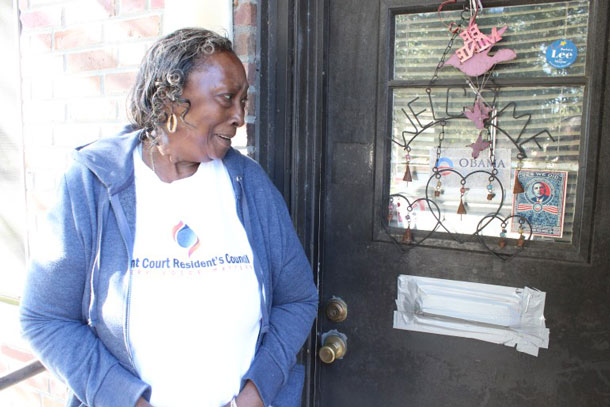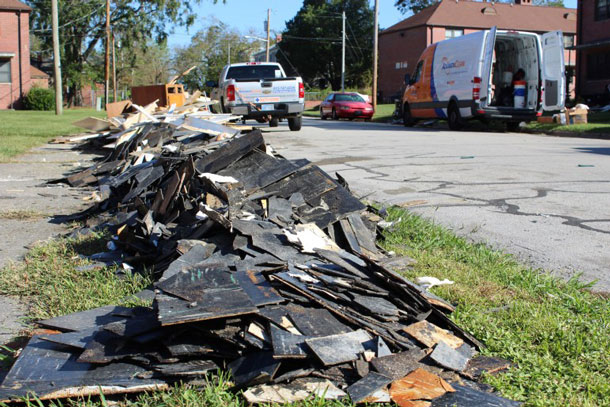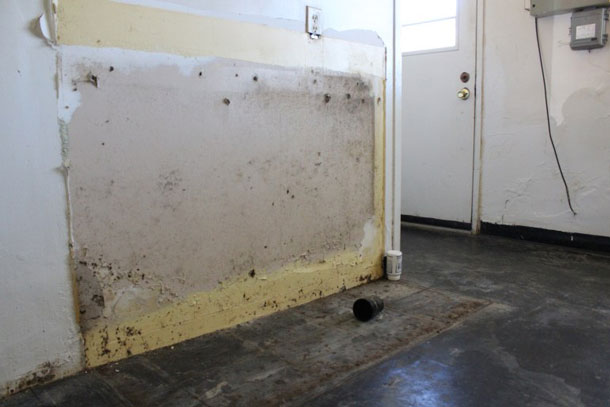Climate Disruption and the Poor
Air Date: Week of January 25, 2019

New Bern resident Cheryl Reed outside her empty townhouse at Trent Court. (Photo: Lewis Raven Wallace)
From sea level rise to hurricanes, climate change impacts are already having life-threatening and life-altering effects on people all around the globe, including in the U.S. Without the financial means to adapt or recover, disadvantaged groups are especially vulnerable to these impacts. Journalist Lewis Raven Wallace, in partnership with Environmental Health News and Scalawag Magazine, reported on how the devastation of a public housing complex in New Bern, North Carolina during Hurricane Florence has left many of its African American residents homeless. Wallace talks with Host Steve Curwood.
Transcript
CURWOOD: It’s Living on Earth, I’m Steve Curwood.
When Hurricane Florence blasted ashore September 14th in North Carolina, it touched off two weeks of severe flooding in the region, and probably no town was hit harder than New Bern along the Neuse River. Trent Court is an aging public housing complex in New Bern. The floods made it unlivable and the bulk of its residents are now struggling through the winter with no safe and secure place to call home. Lewis Raven Wallace reported this story for Environmental Health News and Scalawag Magazine.

Rubble outside of apartments at Trent Court Housing Development, a public housing project near the waterfront in eastern North Carolina. Half the units at Trent Court were flooded during Hurricane Florence. (Photo: Lewis Raven Wallace)
WALLACE: I’m in New Bern, North Carolina, just getting to a church a few blocks from Trent Court housing projects—some guys here are unloading blocks of cement from a truck…right into the doorway
Putting the steps back in right now. I’m here to meet Cheryl Reed, who’s the head of the Trent Court resident council…
REED: So here we are. Would you like to see the stuff we got?
WALLACE: Yeah, please.
REED: It's donated to us to give to our residents…
WALLACE: Cheryl’s all set up in the church basement giving away food staples, diapers, bleach, and hand sanitizer for cleaning. She’s also one of the people, though, who’s permanently displaced by Hurricane Florence…her townhouse in Trent Court public housing was totally flooded.
REED: During the hurricane, it came up four and a half feet.
WALLACE: So you were upstairs?
REED: Yeah. It was scary...wasn't so scary until we heard the crash, and that was the refrigerator. The water lifted it up and turned it over. I finally had to evacuate my apartment.
WALLACE: She tried hard to stay home, because she didn’t want to separate from her dog…
REED: He’s a Cairn Terrier, he's called Winston Churchill. We're two old farts together.
LEWIS: The shelters couldn’t take dogs…but the water kept rising
REED: But eventually I had three outstanding people come and insist that I leave…
WALLACE: She ended up in a shelter for 11 days, and she was anxious the whole time…
REED: And long story short, I got my dog back.
WALLACE: Oh good. I was starting to worry...
REED: I did for a couple of days, and I was bombarding the lady that runs it with constantly calling, calling. And finally she called me and she said, don't worry, sweetie, he's fine.
WALLACE: He was with a foster family—now he’s back with her, in senior housing she’s been able to move into. We head over to Trent Court. It’s a squat collection of brick townhouses, right next to the waterfront.
REED: This is set for demolition. That's the main office over there. And you see how close we are to the water? Yeah, the river was over here.
WALLACE: It’s quiet here and the curbs are still covered with people’s trash, and the gutted insides of houses. Cheryl brought along another member of the resident council.
WALLACE: Can you say your name and where we are?
BUCK: My name is Tyechia Buck and we are in Trent Court
WALLACE: Headed into your apartment. How long have you lived here?
BUCK: I have lived here…November the 12th will be 12 years.
WALLACE: What was your feeling when you came back?
BUCK: I turned my key [opening door sounds] and opened my door and busted out crying.
WALLACE: Was there still water in here when you got back?
BUCK: Yeah. It was about four and a half feet in my apartment. This is where my kitchen sink was. My washer hookup was here, I had a counter over here.
WALLACE: Tyechia and her twelve-year-old son stayed with family, and then a hotel. But their apartment is now on the demolition list…she’s lived in Trent Court more or less her whole life.
Have you ever been through anything like this before?
BUCK: No, this was the worst storm I've ever endured in my twelve years. This is the worst one I remember, period. I'm 36 years old, and been out here for twelve. I grew up here. My mom moved out. You know, we got a house and moved out. My dad died couldn't afford to pay the mortgage anymore so I came back here. And I've been here ever since.
WALLACE: Half the buildings at Trent Court have been approved for demolition by the Department of Housing and Urban Development, with no replacement coming soon. That’s more than 100 families like Tyechia’s with nowhere to go. Now she’s staying in her own empty apartment—no heat, no hot water—so her son can stay in school here in New Bern. She’s considered a squatter.
BUCK: You know, it’s kind of devastating a little bit. I’ve never been through something like this before.
WALLACE: Long term, she’s not sure where she’ll end up.
CURWOOD: That’s Lewis Raven Wallace, who reported from New Bern for Environmental Health News and Scalawag Magazine and he joins us now on the line.
Welcome to Living on Earth, Lewis.
WALLACE: Thanks for having me.
CURWOOD: Talk to me about the history of this community, this African American community and its culture.
WALLACE: So New Bern itself is an old city, it's about 308 years old. And it was an early sentiment place for free black people before emancipation. So, there's a truly historic African-American community there of folks who are seventh generation, 10th generation, New Bernians. Right after emancipation, during Reconstruction, the area that Newbern was in elected, you know, some of the largest percentage of black representatives to Congress of anywhere in the South. And so, it's been a really politically active and culturally meaningful center in eastern North Carolina for the black community there. The historic black neighborhoods were also among the areas that were really hard hit by Hurricane Florence, in addition to the public housing.
CURWOOD: Now, what was the plan for this public housing before and after the storm?
WALLACE: So Trent Court public housing was a lot of this kind of 80 to 100 year old public housing around the country, in that it hadn't been properly up kept for a pretty long time. And for several years now, the local housing authority had been developing a plan to demolish Trent Court and move everyone out of there. In general, when the Department of Housing and Urban Development does that, there is a fairly extensive planning process around making sure that, at least in theory, there's a one-to-one replacement of those units, and folks get vouchers, and they can go someplace else. The way it plays out in practical terms, and has played out has been that about half the folks who leave public housing that gets demolished, don't end up in another public housing unit for a whole variety of reasons. One of the reasons is this sort of situation that we see here in New Bern, where the demolition, due to the housing being in a floodplain, it is now going to happen before schedule and way before there's a replacement housing for folks.

Inside of New Bern resident Tyechia Buck’s apartment at Trent Court Housing Development, everything was gutted after the flooding of Hurricane Florence. She now lives there without electricity. (Photo: Lewis Raven Wallace)
CURWOOD: So people worry about climate gentrification. How could it happen in this place? New Bern, North Carolina.
WALLACE: Well, so it follows a pattern that we kind of most famously saw in New Orleans after Katrina, it just so happened that a lot of that public housing was situated on pieces of land that would ultimately become very, very valuable for redevelopment of new housing for wealthier people. And the same is true at Trent Court in New Bern and a lot of public housing units. 80 years ago, some kind of low lying brick homes down by the river were maybe not considered prime real estate. Now that New Bern’s sort of main economy is tourism, and there's talk about redeveloping the river front and creating a river walk, the Trent Court housing development again, like a lot of that public housing in New Orleans is located in a place that, you know, could become very, very valuable land for real estate developers. Everybody knows that, and everybody sees that, there are real estate developers who sit, you know, on the city council of New Bern. But the reality is that developments for wealthier people where they're spending more money on it can be built up to, sort of, new code and raised up off the ground in a way that we're not seeing that sort of investment in low-income housing, and certainly not in public housing in this day and age. So it sort of happens along this pattern that maybe seems inevitable, but also could be interrupted by public policy or political interventions. And there are certainly people in New Bern who are pushing for that.
CURWOOD: So, convenient then, that the storm came along and accelerated the demise of this public housing from the perspective of some. To what extent is that true?
WALLACE: I think that everybody that I interviewed in New Bern believes that nobody should be displaced, with no place to go. That said that's already happened there's more than 200 people who lost their homes at Trent Court. The reality in New Bern is that there's not a lot of rentals available, that pushes up the price of rentals. Landlords don't have to even take Section 8 vouchers in North Carolina. That's completely up to them, it's legal to discriminate against Section 8 renters. As to whether there are people sort of clapping their hands and cheering about that, nobody's doing that openly, right? But there's also a visible lack of political will, and I would say, particularly at the federal level, to stop this kind of thing from happening.
CURWOOD: Now, what about other poor people being disrupted by climate change and becoming refugees? There is, of course, as you mentioned, the classic case of Katrina, but, how big is this in North America?
WALLACE: Well, something that I find kind of stunning with regard to the public housing situation is that we don't exactly know, you know? After Harvey, obviously, after Katrina, Florence, Matthew, there were a bunch of people in the Florida Panhandle who were displaced, just this last fall,from public housing. But it's not evident to me that that's being sort of clearly tracked. We conduct a census, but we don't track individuals from one place to another demographically across the United States as they move.
CURWOOD: So what would you say the numbers are?
WALLACE: So, one study from the University of Georgia predicts right now that sea level rise alone, so that's just accounting for the effects of sea level rise, and not other climate change effects like drought, or, you know, food shortages that are related to the weather. Sea level rise alone could displace as many as 13 million Americans by the end of this century. Another study found that 1.68 million Americans were internally displaced by disasters just in 2017. So, that's not even including the folks that I've written about here who were displaced in 2018.
CURWOOD: Lewis Raven Wallace is a journalist and editor based in Durham, North Carolina. Thanks so much for taking the time with me today.
WALLACE: Thank you for having me.
Links
Scalawag Magazine | “Poor southerners are joining the globes climate migrants”
Environmental Health News | “Lingering long after a storm, mold and mental health issues”
Living on Earth wants to hear from you!
Living on Earth
62 Calef Highway, Suite 212
Lee, NH 03861
Telephone: 617-287-4121
E-mail: comments@loe.org
Newsletter [Click here]
Donate to Living on Earth!
Living on Earth is an independent media program and relies entirely on contributions from listeners and institutions supporting public service. Please donate now to preserve an independent environmental voice.
NewsletterLiving on Earth offers a weekly delivery of the show's rundown to your mailbox. Sign up for our newsletter today!
 Sailors For The Sea: Be the change you want to sea.
Sailors For The Sea: Be the change you want to sea.
 The Grantham Foundation for the Protection of the Environment: Committed to protecting and improving the health of the global environment.
The Grantham Foundation for the Protection of the Environment: Committed to protecting and improving the health of the global environment.
 Contribute to Living on Earth and receive, as our gift to you, an archival print of one of Mark Seth Lender's extraordinary wildlife photographs. Follow the link to see Mark's current collection of photographs.
Contribute to Living on Earth and receive, as our gift to you, an archival print of one of Mark Seth Lender's extraordinary wildlife photographs. Follow the link to see Mark's current collection of photographs.
 Buy a signed copy of Mark Seth Lender's book Smeagull the Seagull & support Living on Earth
Buy a signed copy of Mark Seth Lender's book Smeagull the Seagull & support Living on Earth

